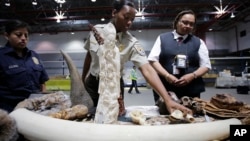U.S. Trade Representative Michael Froman said wildlife poaching is funding terrorism and corruption.
For that reason, Froman said, the U.S. considers poaching a threat to global security because it's driven by criminal elements, including terrorists using profits from items such as rhinoceros horns and elephant tusks to finance their activities.
To meet the threat, U.S. officials are emphasizing the environmental component of the Trans-Pacific Partnership, a trade agreement that the United States is negotiating with 11 countries in the Asia-Pacific region, Froman said in a Reuters report.
Similar efforts are also part of the Transatlantic Trade and Investment Partnership agreement with the European Union, Reuters reported.
Froman spoke at a news conference at Kennedy Airport in New York Monday, standing next to a table heaped with illegal wildlife goods seized by U.S. customs officials.
They included stuffed lion and leopard heads, animal skins and figurines carved out of ivory.
Froman said terrorists use money gained from the illegal wildlife trade in Africa and Asia to fund their deadly activities.
U.S. officials have said they are working to reduce demand for illegal animal products at home and abroad, including Asia, where some believe such goods as powdered rhinoceros have medicinal benefits.
"The high demand for wildlife products is having a devastating impact, with iconic species like elephants and rhinos facing the risk of significant decline or even extinction," Secretary of the Interior Sally Jewell said in a statement reported by Reuters.
"The president's strategy to combat wildlife trafficking, including decreasing demand at home and abroad, is important to strengthen our nation's leadership on countering the global security threat posed by the criminal markets that encourage poaching and illegal trade," Jewell said.
For that reason, Froman said, the U.S. considers poaching a threat to global security because it's driven by criminal elements, including terrorists using profits from items such as rhinoceros horns and elephant tusks to finance their activities.
To meet the threat, U.S. officials are emphasizing the environmental component of the Trans-Pacific Partnership, a trade agreement that the United States is negotiating with 11 countries in the Asia-Pacific region, Froman said in a Reuters report.
Similar efforts are also part of the Transatlantic Trade and Investment Partnership agreement with the European Union, Reuters reported.
Froman spoke at a news conference at Kennedy Airport in New York Monday, standing next to a table heaped with illegal wildlife goods seized by U.S. customs officials.
They included stuffed lion and leopard heads, animal skins and figurines carved out of ivory.
Froman said terrorists use money gained from the illegal wildlife trade in Africa and Asia to fund their deadly activities.
U.S. officials have said they are working to reduce demand for illegal animal products at home and abroad, including Asia, where some believe such goods as powdered rhinoceros have medicinal benefits.
"The high demand for wildlife products is having a devastating impact, with iconic species like elephants and rhinos facing the risk of significant decline or even extinction," Secretary of the Interior Sally Jewell said in a statement reported by Reuters.
"The president's strategy to combat wildlife trafficking, including decreasing demand at home and abroad, is important to strengthen our nation's leadership on countering the global security threat posed by the criminal markets that encourage poaching and illegal trade," Jewell said.





